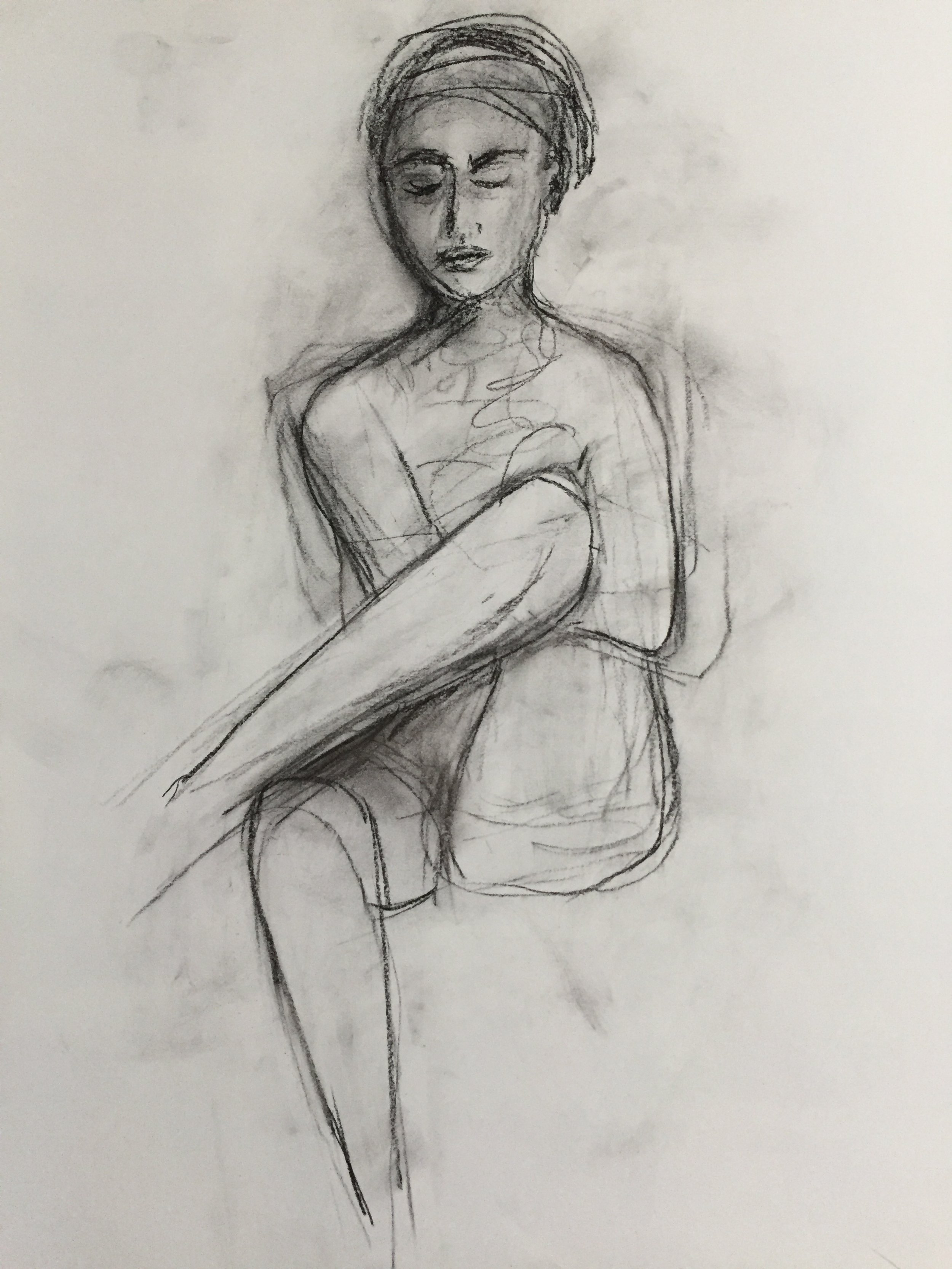Lumpless— By Madison Ellingsworth
Artwork by Arlene Tribbia
My father opened his mouth. Our family peered into it, phones held up as flashlights, heads bobbing around to get a better view. Sister’s boyfriend went white with fright and had to excuse himself. Good, the rest of us thought, more room to see. My father’s eyes darted around the ceiling.
“Wah woo woo ee?” he asked us, his tongue kept flat. What did we see?
I admired the smooth pink edges of his mouth, so sleek and soft, like they must have been the day he came out. But my chest tightened as I looked beyond their pink innocence. A wall of pus—yellow and white and globbed onto everything—hung in the back of his mouth. A beating red vein laid upon the wall. It twitched with every beat of his heart.
Thump thump thump.
Next to the vein ran a thin plastic tube. It traveled down and out of our view; a throat superhighway for escorting liquids from nose to stomach.
“Ow oo I uck?” my father joked. How did he look? We were unresponsive. Transfixed in turn by the exposure of the vein, the heavy weight of the pus, and the meatiness of it all.
I myself was struck by the smell. Scabs. Hospital. Coffee and vinegar. The smell of teeth wearing sweaters, because one long brush stroke could hit that heart-to-brain vein. The smell of ingesting yellow (pus-colored) shakes, the viscosity of nail polish, through a nose tube. Of lump biopsy results. Of picking up the doctor’s call. Of walking and not running, because today, yesterday, this week, and last, were just a little too tiring.
Though my father has regrown, filled in his crevices, and brushed clean with paste and minty alcohol, I can still sometimes smell his healing mouth. When he first wakes in the morning, or lets out a belly laugh from deep inside, or on a humid blue-sky day when we are running together. Those days that make even our forearms sweat.
We, the family, regained our composure. Everyone nodded their approval and assured my father that his pus looked great. Wait, his vein looked great. Wait, his throat looked great. We turned off our phone lights and stowed them away. No photos were taken.
“This is why we got you vaccinated,” my mother whispered to me, as the room slowly emptied. “Thank God.” She joined in the exit and crept to her respective corner of the house, wearing gratitude like chain mail.
I stayed in the kitchen with my father and watched him twist the cap off a nutrient shake. But where was God, really, I wondered, as the cap fell to the table. Had he been standing next to us, holding up his phone flashlight, and peering into my father’s mouth? Had he been there during my father’s surgery, watching the robot cut him with precision? Had he been there forty years ago, when my father contracted the virus that gave him his lump?
My father drew the shake into a nasal syringe and laid it on the table. A bubble of air was bound inside the plastic, waiting to be pushed free. Staring at the bubble, I decided that God had never looked deep into my father’s mouth and watched him thump thump thump away. He left that for my family, the doctor, and the robot.
“It did this surgery on beagles first,” my father said, reading my thoughts. Drawing another syringe of shake, he told me that the robot was operated by university students. They opened the sleeping beagles’ mouths wide enough to slide the robot’s arm in. “That robot is a marvel of machinery. It can do things none of us can.”
God-like, I thought to myself.
I asked him to tell me more about the beagles. I wondered aloud if they had been pets, deeply loved, or if they had been grown inside a pot-bellied mama beagle who lived in a lab. Had they seen sunshine? Had the surgery helped them live longer? Or had it been the culminating event in a white light, steel bowl, pee-pad life?
My father was exasperated. “I feel guilty enough about the beagles,” he said. He left the room after placing his syringes to chill in the fridge. But my mind and I were stuck to our seat.
Without those beagles, my father’s infected lump cells would have crawled into his lymph nodes, and that would have been the end. The end of early mornings, runs together on blue-sky days, and belly laughs.
The empty shake carton sat on the table, and I sat thinking about how I could thank those beagles. I wondered if I could get their mailing address from the God-like robot. Filled with a new sense of purpose, I composed a letter in my mind.
Dear Beagles, I began.
Seeing the inside of my father’s mouth, with its pus, tubing, and thick beating vein, was a gift. A gift that you and your owners (or you and your lab-grown mama beagle) gave to my father. Which, in turn, was a gift from you to me. It was the gift of looking into my father’s lumpless mouth. And what more could anyone ask for?
Feeling dissatisfied, I stood and picked up the shake carton. A little bit still sloshed around, so I drank it. It tasted like vanilla-flavored tin can. I threw the empty container in the trash bin and crawled to my respective corner of the house, searching for paper.
As I penned my letter to the beagles, I had a realization. How would they know who was writing to them? In the end I signed my name: With Eternal Gratitude.
Madison Ellingsworth is a ceramicist by day and an editor by night. Her writing has been published in West Trade Review, NonBinary Review, and more. More of Madison's work can be found at madisonellingsworth.com.
